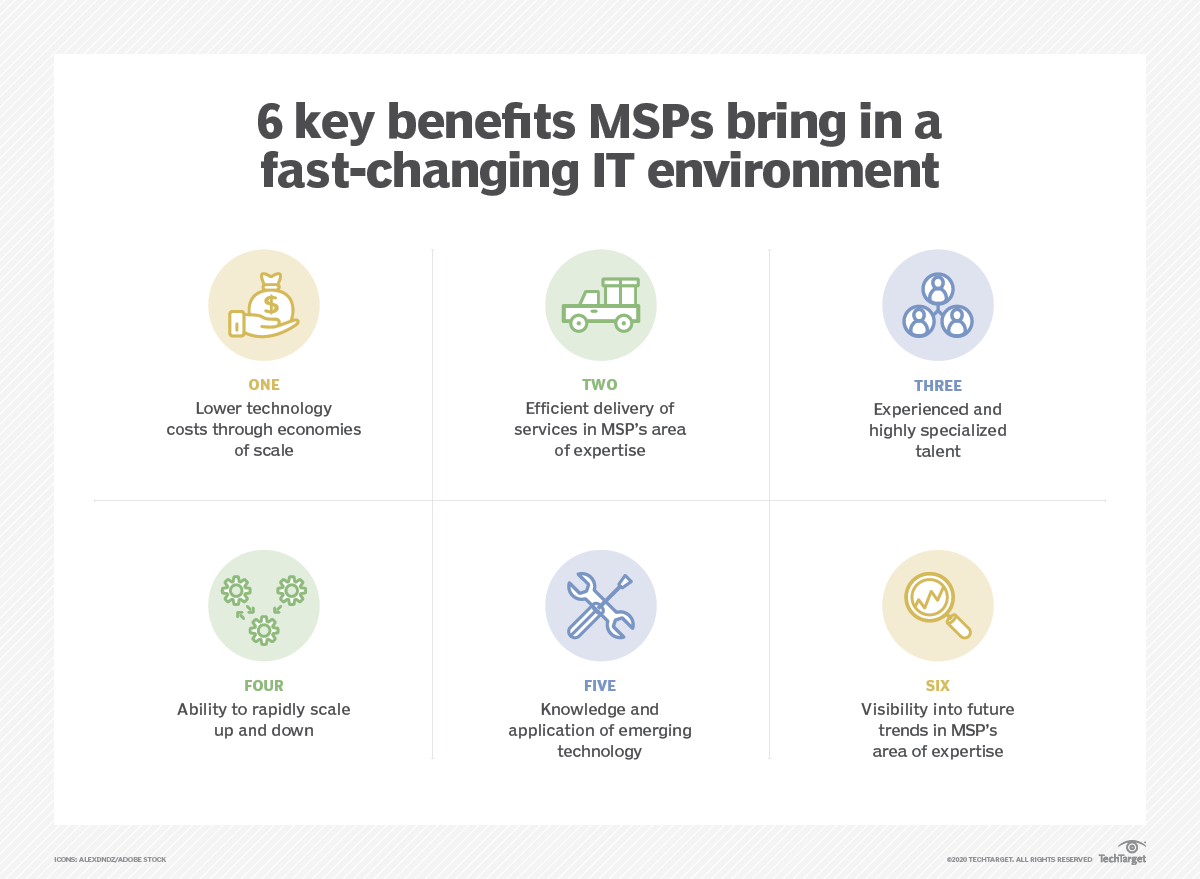How to Choose Managed Services Provider For Your Business
Imagine finding yourself entangled in a web of technical issues, cybersecurity threats, and operational inefficiencies. Frustrating, isn’t it?
This is the grim reality for many businesses that fail to make the right choice when it comes to selecting a Managed Services Provider (MSP).
A managed services provider offers specialized IT services and solutions to businesses, including but not limited to IT functions like network monitoring, security, and data backup for clients. MSPs are well-equipped to fully handle your IT needs, freeing you to focus on your core business. No wonder the managed services market is on the rise.
| As Deborah Walck, COO of Orange County Computer says, “Managed services are the key to scalable growth, offering the agility and expertise your business needs.” |
In this blog, we’ll dig deep into how to choose a managed services provider that aligns with your business objectives.
Stuck in a Loop of Reactive IT Management?
Orange County Computer specializes in proactive strategies for long-term success.
Get StartedManaged Services Selection Criteria
Prior to seeking out a managed services provider, you must first understand what services you need. Understanding these categories can help you formulate better questions to ask during MSP discovery.
| Type of Managed Service | Key Features | Benefits to Your Business |
| Managed Network Services | Network setup, monitoring, optimization | Improved network reliability |
| Managed Security Services | Firewalls, threat detection, incident response | Enhanced security posture |
| Managed Cloud Services | Cloud migration, maintenance, support | Efficient use of cloud resources |
| Managed IT Support | Helpdesk, software updates, hardware maintenance | Reduces downtime, improves productivity |
| Managed Data Analytics | Data collection, analysis, visualization | Data-driven decision-making |
| Managed Cybersecurity | Endpoint security, intrusion detection, risk assessment | Protects against evolving cybersecurity threats |
| IT Consulting | Strategy development, system design, project management | Aligns IT strategy with business objectives |
Knowing what you require will help you gauge whether an MSP offers a wide range of solutions that are a good fit for your business. Next, evaluate the following aspects:
1. Track Record and Expertise
A strong track record is a good indicator of reliability. Look for case studies or testimonials to gauge the MSP’s real-world performance. Their track record can also highlight their areas of expertise and sectors they’ve successfully serviced.

Source: TechTarget
2. Time and Resources
Assess the time and resources the MSP will require from your team. The goal is to lessen your workload, not add to it. Choose an MSP that offers effective management tools to streamline operations and save time.
3. Scalability
Check if the MSP offers scalable solutions that can adapt as your business grows. This is essential for long-term partnerships. An MSP should be able to support your evolving needs with a wide range of services.
4. Communication and Support
Good communication is crucial for effective problem-solving and incident response. Assess the provider’s communication channels and responsiveness. Regular updates and clear communication lines can significantly improve service delivery.
5. Compliance and Certification
Ensure that the MSP adheres to industry regulations and holds necessary certifications. Compliance with standards ensures data safety and legal protection. These credentials add an extra layer of trust and reliability.
6. Costs and Pricing
Keep an eye on your bottom line while considering the costs. Remember that the cheapest option may not provide the best value. Evaluate if the services offered justify the cost and align with your budget constraints.
In fact, a survey by CompTIA found that 46% of managed IT service consumers have reduced their annual IT costs by 25% or more by partnering with an efficient MSP
Struggling with High IT Costs?
Slash Annual IT Costs by 45% with Orange County Computer.
Cut Costs Now7. Technical Skills & Expertise
Look for an MSP with a strong set of technical skills that match your needs. Whether it’s cloud services or disaster recovery plans, the MSP should have the expertise to handle it. Ensure their technical competencies align with your industry requirements.

Source: IBM
8. Service-Level Agreements (SLAs)
Carefully review the SLAs provided by the MSP. These outline the services you can expect, including response times and resolution metrics. A well-defined SLA sets the standard for accountability and performance.
9. Industry Experience
An MSP with experience in your industry will understand your specific challenges better. They can offer tailored solutions that others might not. Industry experience ensures a more seamless integration of services.
10. Automation Technology
Automation can bring efficiency to day-to-day operations. Check if the MSP employs modern automation technology to simplify tasks. This allows for quicker responses and better use of time and resources.
11. Transparent Pricing
Transparent pricing avoids hidden costs and ensures you know exactly what you’re paying for. Look for detailed breakdowns that explain each service component. Transparency in pricing builds trust and simplifies budgeting.
12. Comprehensive Services
Choose an MSP that offers comprehensive services to cover all aspects of your IT needs. From routine management to incident response, a full-service MSP can provide a one-stop solution. This breadth of services allows for simpler and more cohesive management.
Learn More About the Managed IT Services: |
How to Choose Managed Security Services
In the quest to understand how to choose managed security services, scrutinize how each MSP approaches threat detection and their capabilities in managing security incidents. A robust security offering can fortify your business against a variety of risks.
It’s important to note that 51% of organizations are planning to increase security investments as a result of a breach, including incident response (IR) planning and testing, employee training, and threat detection and response tools.
Security-Focused Questions to Ask an MSP
To better understand their security offerings, use these questions to ask an IT MSP:
What methods are employed for threat detection?
- How do you work to improve our security posture?
- Do you offer real-time monitoring and alerts for security incidents?
- What are your protocols for incident response and crisis management?
- Can you explain your managed security services in detail?
- How do you manage data backups and disaster recovery plans?

Questions to Ask During MSP Discovery
Start the discovery phase by asking your potential MSPs about their specific services.
- What types of managed security services do you provide?
- How does your disaster recovery plan work?
- Can you discuss your response times in case of an emergency?
Technical Questions to Qualifying MSP
Your MSP qualifying questions should dig deeper into the technical aspects.
- How do you approach incident response?
- What is your security posture?
- Do you offer cloud services?
- Such technical questions to qualify MSP are crucial in determining how well-equipped they are to deliver specialized solutions.
Why MSP Offerings Matter
Additional Questions to Ask IT MSP
Make sure to ask these questions to ask an MSP for long-term considerations:
- What kind of customer support can we expect in terms of availability and response time?
- Do you have experience collaborating with other vendors or systems we currently use?
- What is your policy on data ownership and portability?
- How do you manage a transition or onboarding process?
- Can you provide references from clients in our industry or of a similar size?
- How quickly can you implement changes or updates to services?
- Do you offer consulting services for technology strategy and planning?
Finding Your Ideal Managed Services Partner
Selecting an MSP is a crucial business decision that impacts your operations, security, and long-term success. Utilizing the correct managed services selection criteria and asking the right questions to an MSP can make the difference between merely maintaining your business and truly thriving.
When you choose an experienced provider like Orange County Computer, you’re not just hiring a service; you’re gaining a strategic partner with over 25 years of expertise.
Trusted Managed IT Services in Orange County |
Our expertise spans from everyday IT management to advanced security solutions, all customized to align with your business needs. Committed to staying ahead of evolving technologies, we bring the most current and effective solutions to your doorstep.
Trust us to manage your IT complexities so you can concentrate on your core business goals. Connect with us now for a complimentary consultation.

